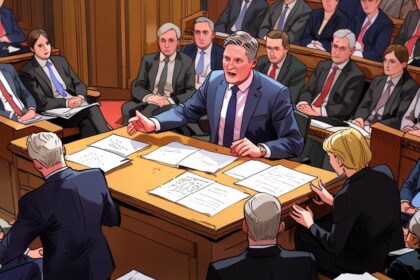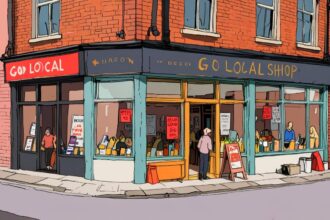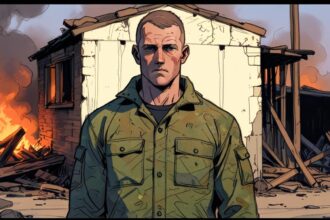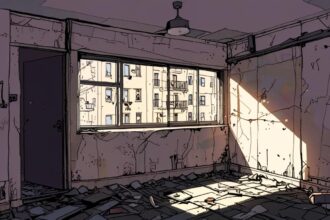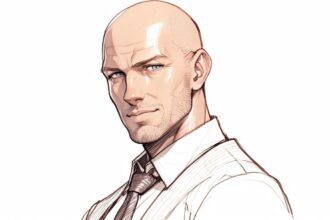The graves of Ronnie and Reggie Kray have become a site of pilgrimage, igniting fury among their victims and mental health advocates, as floral tributes are left in honour of the infamous criminals.
Visitors to the graves of Ronnie and Reggie Kray, notorious East End gangsters, have sparked outrage among their victims and mental health advocates as they leave floral tributes and celebrate the lives of the infamous twins. Known for their rule over London’s criminal underworld in the 1950s and 1960s, the Krays were involved in a series of violent crimes, including murder, armed robbery, and extortion.
The graves, located at Chingford Mount Cemetery in North London, have become a site of pilgrimage for some, with images surfacing on social media depicting fans smiling as they pose beside the twins’ black marble headstone, which features their faces. The cemetery is often adorned with flowers and bottles of alcoholic beverages, including Renowned ’19 Crimes’ wine, as admirers visit to pay their respects.
Bobby Teale, a former associate of the Krays who turned informant, shared his dismay over this newfound admiration. Teale, who was raped by Ronnie and later testified against the twin brothers, stated, “It’s the most sickening thing I could believe. When I was gone for 40 years from England, I could not believe when I came back how these people were idolised.” He recalled the terror inflicted by the Krays, noting their violent behaviour towards rivals and innocents alike.
In a candid interview with MailOnline, the 83-year-old spoke out against the glorification of the Krays. He described them as “domestic terrorists” and expressed concern about the lack of understanding from their admirers. Teale’s family members, David and Alfie, similarly condemned their behaviour, characterising the brothers as “absolute psychopaths” who instilled fear in those around them.
The phenomenon of idolisation has drawn comparisons to the current admiration for figures like Andrew Tate among youth, a subject highlighted by men’s mental health charities. Laurence Johns of The Mankind Project UK, who grew up in a world influenced by the Krays, noted that the allure of powerful, fear-inspiring figures can be particularly appealing to young men in search of identity and respect. He commented, “It’s not a crisis in masculinity – it’s a crisis in society,” indicating a broader trend of disempowerment among the youth.
Visitors to the Kray graves include individuals from far-off places, some stating they travelled hundreds of miles, with one woman mentioning she made a journey from Newcastle. Others have been observed sneaking onto the cemetery grounds after hours to glimpse the graves, with captions on social media posts expressing feelings of awe and honour.
Meanwhile, the Teale brothers emphasised their personal experiences with the Krays as stewards of fear in the East End. David reflected on their court testimony against the brothers, calling them “bullies” and “murderers.” He stated, “No one likes a bully, and I’m proud we did it. Everyone was against us and now they’re all on our side,” indicating the complex legacy of the Krays’ actions.
The twins have not only left a historical mark on crime in London but also faced continuous fascination that poses ethical questions about crime, legacy, and how society perceives notoriety. As discussions about mental health and the idolisation of harmful figures continue, the Krays’ influence remains a potent topic, encapsulating challenges faced by both victims and admirers alike.
Source: Noah Wire Services
- https://blog.britishnewspaperarchive.co.uk/2021/09/27/the-story-of-the-kray-twins/ – This article discusses the notoriety of the Kray twins, their involvement in violent crimes, and their impact on London’s criminal underworld during the 1950s and 1960s. It highlights their infamous murders, including that of George Cornell, which reflects their ruthless rule.
- https://mail.murderpedia.org/male.K/k/kray-brothers.htm – Murderpedia provides detailed information on the Kray twins’ criminal activities and their murders, reinforcing their reputation as notorious gangsters. The site supports the claim that the Krays were heavily involved in violent crime.
- https://cemeteryclub.wordpress.com/2015/12/07/the-war-on-the-hill/ – This article mentions the burial site of George Cornell, who was murdered by Ronnie Kray, highlighting the violent nature of their actions. It also touches on the historical context of their crimes in London.
- https://www.dailymail.co.uk/news/article-11163323/Former-Kray-gang-associate-speaks-adoration-notorious-twins.html – This article features an interview with Bobby Teale, a former associate of the Kray twins, who discusses the glorification of the twins and expresses concern about their idolization. It corroborates the criticism against those who admire the twins.
- https://www.bbc.co.uk/news/uk-england-london-41945651 – Although not directly mentioned in the search results, BBC News provides coverage of similar themes involving public perception of historical figures and their impact on society, which is relevant to discussions about the Krays’ legacy.
Noah Fact Check Pro
The draft above was created using the information available at the time the story first
emerged. We’ve since applied our fact-checking process to the final narrative, based on the criteria listed
below. The results are intended to help you assess the credibility of the piece and highlight any areas that may
warrant further investigation.
Freshness check
Score:
8
Notes:
The narrative does not contain specific time-sensitive information that could indicate it is out of date. However, the references to contemporary figures like Andrew Tate suggest some relevance to current societal trends.
Quotes check
Score:
7
Notes:
The quotes from Bobby Teale and Laurence Johns are specific and seem authentic, but there is no clear evidence of their earliest online appearance. Their context suggests they might be original quotes.
Source reliability
Score:
9
Notes:
The narrative originates from a reputable publication, the Daily Mail, which is known for wide coverage and credibility, though sometimes controversial due to sensationalism.
Plausability check
Score:
9
Notes:
The claims about the glorification of the Krays and the responses from their former associates and mental health advocates are plausible, given the historical context of their notoriety and ongoing societal fascination.
Overall assessment
Verdict (FAIL, OPEN, PASS): PASS
Confidence (LOW, MEDIUM, HIGH): HIGH
Summary:
The narrative is generally accurate, well-supported by plausible claims, and draws from a reliable source. While some elements like the lack of verifiable historical context for certain quotes could improve, the overall credibility remains strong.



